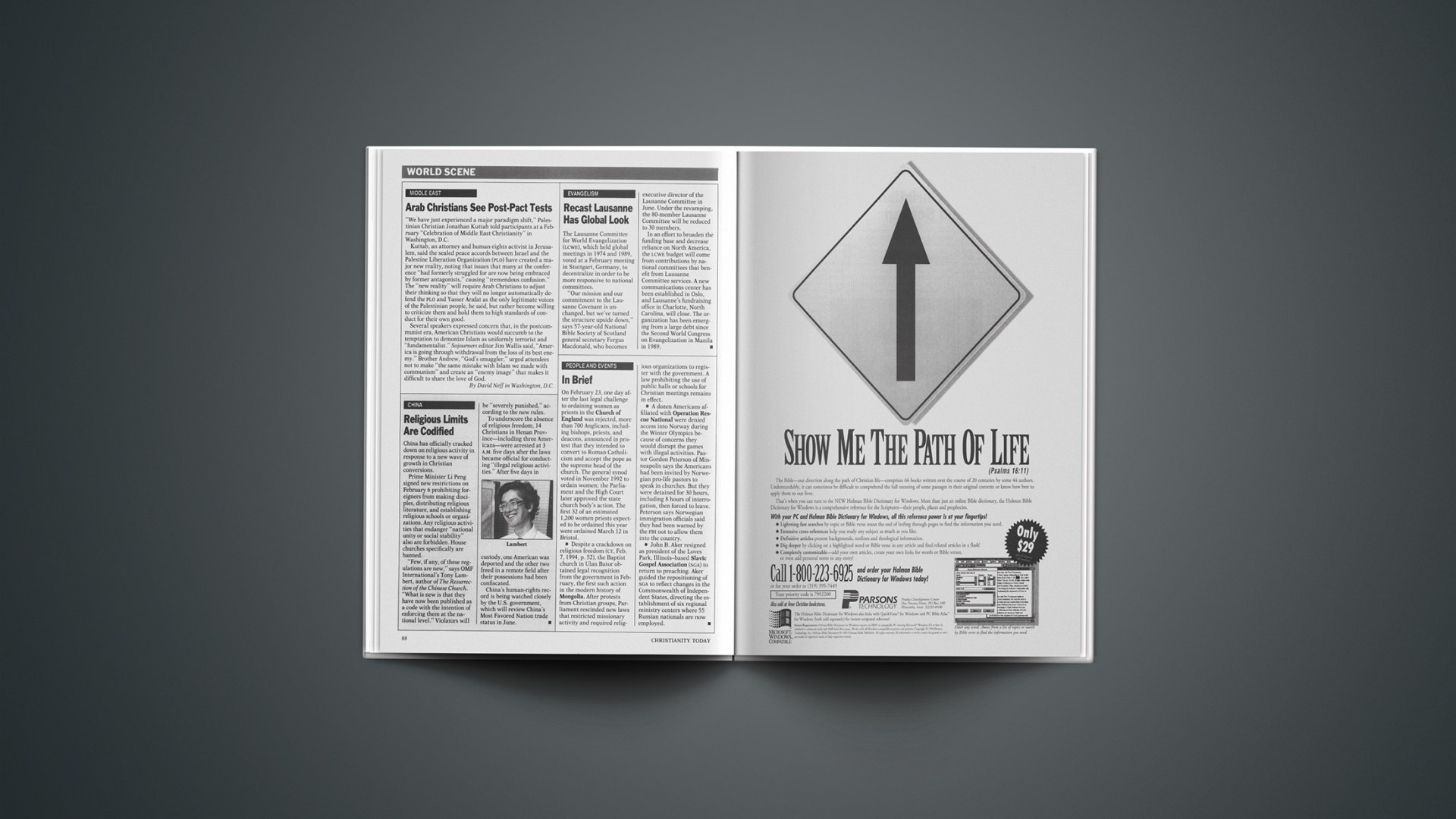MIDDLE EAST
Arab Christians See Post-Pact Tests
“We have just experienced a major paradigm shift,” Palestinian Christian Jonathan Kuttab told participants at a February “Celebration of Middle East Christianity” in Washington, D.C.
Kuttab, an attorney and human-rights activist in Jerusalem, said the sealed peace accords between Israel and the Palestine Liberation Organization (PLO) have created a major new reality, noting that issues that many at the conference “had formerly struggled for are now being embraced by former antagonists,” causing “tremendous confusion.” The “new reality” will require Arab Christians to adjust their thinking so that they will no longer automatically defend the PLO and Yasser Arafat as the only legitimate voices of the Palestinian people, he said, but rather become willing to criticize them and hold them to high standards of conduct for their own good.
Several speakers expressed concern that, in the postcommunist era, American Christians would succumb to the temptation to demonize Islam as uniformly terrorist and “fundamentalist.” Sojourners editor Jim Wallis said, “America is going through withdrawal from the loss of its best enemy.” Brother Andrew, “God’s smuggler,” urged attendees not to make “the same mistake with Islam we made with communism” and create an “enemy image” that makes it difficult to share the love of God.
By David Neff in Washington, D.C.
CHINA
Religious Limits Are Codified
China has officially cracked down on religious activity in response to a new wave of growth in Christian conversions.
Prime Minister Li Peng signed new restrictions on February 6 prohibiting foreigners from making disciples, distributing religious literature, and establishing religious schools or organizations. Any religious activities that endanger “national unity or social stability” also are forbidden. House churches specifically are banned.
“Few, if any, of these regulations are new,” says OMF International’s Tony Lambert, author of The Resurrection of the Chinese Church. “What is new is that they have now been published as a code with the intention of enforcing them at the national level.” Violators will be “severely punished,” according to the new rules.
To underscore the absence of religious freedom, 14 Christians in Henan Province—including three Americans—were arrested at 3 A.M. five days after the laws became official for conducting “illegal religious activities.” After five days in custody, one American was deported and the other two freed in a remote field after their possessions had been confiscated.
China’s human-rights record is being watched closely by the U.S. government, which will review China’s Most Favored Nation trade status in June.
EVANGELISM
Recast Lausanne Has Global Look
The Lausanne Committee for World Evangelization (LCWE), which held global meetings in 1974 and 1989, voted at a February meeting in Stuttgart, Germany, to decentralize in order to be more responsive to national committees.
“Our mission and our commitment to the Lausanne Covenant is unchanged, but we’ve turned the structure upside down,” says 57-year-old National Bible Society of Scotland general secretary Fergus Macdonald, who becomes executive director of the Lausanne Committee in June. Under the revamping, the 80-member Lausanne Committee will be reduced to 30 members.
In an effort to broaden the funding base and decrease reliance on North America, the LCWE budget will come from contributions by national committees that benefit from Lausanne Committee services. A new communications center has been established in Oslo, and Lausanne’s fundraising office in Charlotte, North Carolina, will close. The organization has been emerging from a large debt since the Second World Congress on Evangelization in Manila in 1989.
PEOPLE AND EVENTS
In Brief
On February 23, one day after the last legal challenge to ordaining women as priests in the Church of England was rejected, more than 700 Anglicans, including bishops, priests, and deacons, announced in protest that they intended to convert to Roman Catholicism and accept the pope as the supreme head of the church. The general synod voted in November 1992 to ordain women; the Parliament and the High Court later approved the state church body’s action. The first 32 of an estimated 1,200 women priests expected to be ordained this year were ordained March 12 in Bristol.
• Despite a crackdown on religious freedom (CT, Feb. 7, 1994, p. 52), the Baptist church in Ulan Bator obtained legal recognition from the government in February, the first such action in the modern history of Mongolia. After protests from Christian groups, Parliament rescinded new laws that restricted missionary activity and required religious organizations to register with the government. A law prohibiting the use of public halls or schools for Christian meetings remains in effect.
• A dozen Americans affiliated with Operation Rescue National were denied access into Norway during the Winter Olympics because of concerns they would disrupt the games with illegal activities. Pastor Gordon Peterson of Minneapolis says the Americans had been invited by Norwegian pro-life pastors to speak in churches. But they were detained for 30 hours, including 8 hours of interrogation, then forced to leave. Peterson says Norwegian immigration officials said they had been warned by the FBI not to allow them into the country.
• John B. Aker resigned as president of the Loves Park, Illinois-based Slavic Gospel Association (SGA) to return to preaching. Aker guided the repositioning of SGA to reflect changes in the Commonwealth of Independent States, directing the establishment of six regional ministry centers where 55 Russian nationals are now employed.










